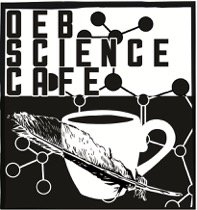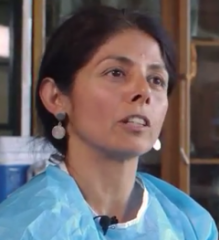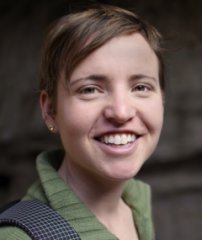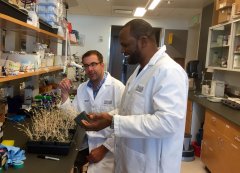News Highlights
OEB Science Café Videos
OEB Science Café Videos
OEB Science Cafe continues to go strong, as OEB's signature outreach activity. Amherst Media has filmed and edited some of our recent café events; the links are posted here: https://oebsciencecafe.org/previous-cafes/. So check ‘em out, in case you missed them the first time or just want to relive the magic!
Between the folds with the small and mighty: Ligands guiding the folding of proteins in surprising ways
Between the folds with the small and mighty: Ligands guiding the folding of proteins in surprising ways
MCB students in the Gierasch and Garman labs at UMass, Amherst, have advanced the understanding of the relationship between protein folding and ligands, very small (~100 daltons in size) molecules which reside in the cell. Ligands were found to guide much larger molecules in the folding process, by recent MCB Alumnus, Karan Hingorani. Misfolded proteins are often the cause of disease, and the findings, by Hingorani, and confirmed by current MCB Program students, Mathew Metcalf and Derrick Deming have important implications in new therapies and pharmacological treatments of disease. Read more
Pilotte receives Bill and Melinda Gates Foundation Grand Challenges Explorations Phase II Award
Pilotte receives Bill and Melinda Gates Foundation Grand Challenges Explorations Phase II Award
Nils Pilotte, a 4th year student in the University of Massachusetts Amherst Molecular and Cellular Biology Ph.D. Program, recently received a Bill and Melinda Gates Foundation Grand Challenges Explorations Phase II Award in the amount of $424,874. This award, which was received as a follow-up to a 2013 Phase I award in the amount of $100,000, will expand upon his preliminary proof-of-concept research, and aims to enable low-cost, high-throughput, sustainable surveillance for the presence of tropical parasites through the molecular monitoring of hematophagic insect excreta/feces (E/F). Through the sampling and analysis of E/F rather than whole insects, the biological mass of samples can be greatly reduced, minimizing the limitations imposed by the presence of large concentrations of “polluting” DNA, and allowing for the improved throughput of testing. Furthermore, as non-vector insects which have taken a parasite-containing blood meal rid themselves of parasite material through deposition in the E/F, such testing expands the pool of material suitable for analysis. Preliminary work has demonstrated the adaptability of this methodology to the detection of both filarial and malarial parasites, and Nils will work to fine tune these testing platforms with the goal of developing recommendations for the programmatic implementation of this alternative approach to infection monitoring and surveillance.
Patricia Brennan's research is featured in Science Magazine videos:
Patricia Brennan's research is featured in Science Magazine videos:
Episode webpage: http://www.sciencemag.org/projects/xxfiles/9
Youtube links:
XX Files : Animalia genitalia : Patty Brennan : https://youtu.be/lNJ5tibNKyg
XX Files : Animalia genitalia : Duck surprise [CLIP] : https://youtu.be/YtYnpvIp1QM
XX Files : Animalia genitalia : My science is basic science [CLIP] https://youtu.be/VoqmhI24wiQ
XX Files : Animalia genitalia : Diversity in science [CLIP] : https://youtu.be/5zIRqDeYU_0
Search For Darwin Fellow Is Underway
Search For Darwin Fellow Is Underway
The Graduate Program in Organismic and Evolutionary Biology at University of Massachusetts Amherst announces a two-year postdoctoral FELLOWSHIP/lectureship. OEB draws together more than 90 faculty from the Five Colleges (University of Massachusetts Amherst and Smith, Hampshire, Mount Holyoke and Amherst Colleges), offering unique training and research opportunities in the fields of ecology, organismic and evolutionary biology. Our research/lecture position provides recent PhD's an opportunity for independent research with an OEB faculty sponsor, as well as experience mentoring graduate students and teaching a one-semester undergraduate biology course. To be qualified, a candidate must have a recent PhD in a field relevant to ecology, organismic or evolutionary biology and proven teaching skills. Position subject to availability of funds. Read more...
Amy Strauss Awarded Graduate School Dissertation Research Grant
Amy Strauss Awarded Graduate School Dissertation Research Grant
Amy Strauss was awarded a Graduate School Dissertation Research Grant to support her work on song learning in birds. Amy's research explores how certain social and acoustic factors affect the song development process in juvenile male songbirds. During the summer of 2016, she hand-reared wild-caught males in the lab and controlled their acoustic environment throughout the sensitive song learning phase. She presented audio & video stimuli to simulate different acoustic and interactive contexts the birds may encounter in the wild.To understand how these different contexts influence song development, she will use this grant funding to obtain high-quality recordings of the lab males once their songs are crystallized, and perform acoustic analysis to determine song learning outcomes. This research will provide insight into the developmental mechanisms underlying individual variation in bird song learning. Amy is an OEB PhD candidate in the Podos Lab.
Broadley awarded Graduate School Dissertation Fieldwork Grant
Broadley awarded Graduate School Dissertation Fieldwork Grant
Hannah Broadley was awarded a Graduate School Fieldwork Grant to help cover the travel costs for her spring and summer fieldwork. Hannah is studying the interactions of predators, parasitoids, and pathogens of the invasive forest pest, winter moth, and its native congener Bruce spanworm. With this support, Hannah will complete her collection of winter moth and Bruce spanworm parasitoids. This award follows her recent publication “The phylogenetic relationship and cross-infection of nucleopolyhedrovires between the invasive winter moth (Operophtera brumata) and its native congener, Bruce spanworm (O. bruceata)” in the Journal of Invertebrate Pathology. She found that the two species do not appear to share pathogens, but she hypothesizes that they do share parasitoids. Her upcoming fieldwork will help answer this. Broadley is an OEB Phd candidate in the Elkinton lab.
Plastics Compound BPS Alters Mouse Moms’ Behavior and Brain Regions--UMass Amherst Study Finds Impaired Behavior in Pregnant and Lactating Mice
Plastics Compound BPS Alters Mouse Moms’ Behavior and Brain Regions--UMass Amherst Study Finds Impaired Behavior in Pregnant and Lactating Mice
In the first study of its kind, environmental health scientist Laura Vandenberg and neuroscientist Mary Catanese at the University of Massachusetts Amherst examined the effects of the compound bisphenol S (BPS) on maternal behavior and related brain regions in mice. They found subtle but striking behavior changes in nesting mothers exposed during pregnancy and lactation and in their daughters exposed in utero. Read more...
Sam Hazen awarded NSF grant to study gene regulation of cell wall growth in Brachypodium in collaboration with local biotechnology group
Sam Hazen awarded NSF grant to study gene regulation of cell wall growth in Brachypodium in collaboration with local biotechnology group
The grass species Brachypodium is a model for the Hazen lab to better understand the transcription networks regulating secondary cell wall biosynthesis. The research grant from the National Science Foundation (NSF) is part of a Small Business Innovation Research program, and the three-year $713,000 award will fund research aimed at demonstrating how higher yields of renewable biomass can be provided by adapting the processes of secondary cell wall gene regulation that take place in grasses. Read More
Life Sciences Graduate Research Symposium
Life Sciences Graduate Research Symposium
The 6th annual UMass Life Sciences Graduate Research Symposium will be held on Friday, December 2. The event brings together graduate students from all areas of life sciences research at UMass to present their work in both talks (9:00 am-5:00 pm, Life Sciences Laboratories Building, Room S340) and a poster session/reception (5:00-6:00 pm). This event is open to everyone who wants to learn about the fantastic life sciences work going on at UMass! The schedule for presentations is available on the LSGRC website.






